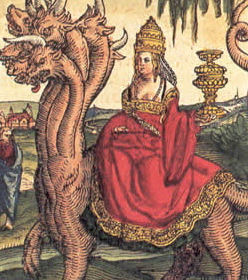\ˌmer-ə-ˈtri-shəs\
But whenever I run across the word I have trouble remembering that it’s supposed to be an insult. I wondered at first whether some bit of glamour from its near-homophone “meritorious” was clinging to it? After all, “meritorious” is a noble word, with noble associations. It means “worthy, deserving of praise.” Here’s Fabian’s Chronicles in 1494:
So what happened, that one branch of the word is laudatory and the other an insult?
Alas, it’s one of the oldest stories in the world. Merērī—whence “meritorious”—often referred to a soldier earning wages. A praiseworthy endeavor. But “meretricious” comes from an offshoot noun, meretrix—meaning a woman who works for pay. Therefore a prostitute, because Obviously. What else?
Here’s Sir Francis Bacon in 1626, using the word in its more literal sense:
When the word began to be used in a more figurative sense things started getting really ugly. Here’s a 17th century Protestant getting all riled up about the Catholics:
| Now I’ve been to the Vatican, and I will grant that it is pretty darn gaudy. But this is not just about bad taste. This guy wants you to be repulsed by Rome’s wealth and corruption, so naturally he emphasizes how gross and female it all is. Not only have you got a gesture towards the Whore of Babylon (a favorite Protestant trope), all bedizened on the outside and corrupt and stinking within, you’ve ALSO got the prurient fascination with sluttish “Conventicles,” themselves presumably riddled with madness and disease. (There is an entire genre of anti-Catholic screeds that essentially boils down to Nuns Gone Wild.) |
Perhaps this is why I find myself unwilling to accept “meretricious” as a pejorative. I am a woman who works for pay. And I don’t like to see a meritorious word end up saddled with the whole messy baggage of the Patriarchy.


 RSS Feed
RSS Feed